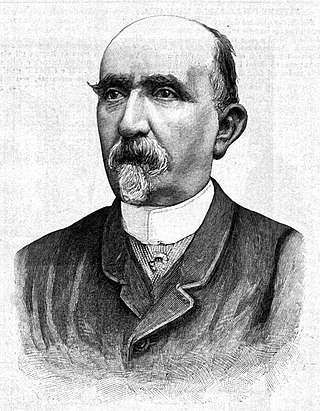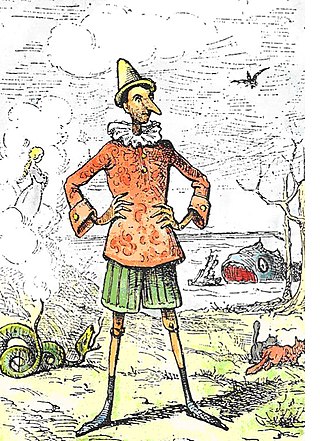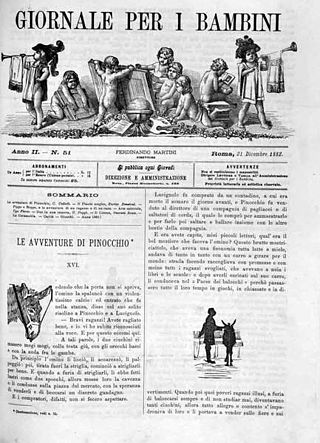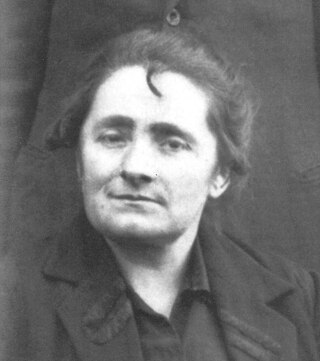This article needs additional citations for verification .(February 2013) |
| |||
|---|---|---|---|
| +... | |||
This article contains information about the literary events and publications of 1883.
This article needs additional citations for verification .(February 2013) |
| |||
|---|---|---|---|
| +... | |||
This article contains information about the literary events and publications of 1883.


Carlo Lorenzini, better known by the pen name Carlo Collodi, was an Italian author, humourist, and journalist, widely known for his fairy tale novel The Adventures of Pinocchio.

The Adventures of Pinocchio, commonly shortened to Pinocchio, is an 1883 children's fantasy novel by Italian author Carlo Collodi. It is about the mischievous adventures of an animated marionette named Pinocchio, which he faces many perils and temptations, meets characters that teach him about life, and learns goodness before he achieves his heart's desire of becoming a real boy.
This article contains information about the literary events and publications of 1896.
This article contains information about the literary events and publications of 1892.

This article contains information about the literary events and publications of 1887.
This article contains information about the literary events and publications of 1889.
This article contains information about the literary events and publications of 1885.
You don't know about me without you have read a book by the name of 'The Adventures of Tom Sawyer'; but that ain't no matter. That book was made by a Mr Mark Twain, and he told the truth, mainly.
This article contains information about the literary events and publications of 1882.
This article contains information about the literary events and publications of 1881.
This article contains information about the literary events and publications of 1880.
This article contains information about the literary events and publications of 1872.
This article presents lists of the literary events and publications in 1862.
This article contains information about the literary events and publications of 1852.
This article contains information about the literary events and publications of 1850.

Pinocchio is a fictional character and the protagonist of the children's novel, The Adventures of Pinocchio (1883) by Italian writer Carlo Collodi of Florence, Tuscany. Pinocchio was carved by a woodcarver named Geppetto in a Tuscan village. He is created as a wooden puppet, but he dreams of becoming a real boy. He is known for his long nose, which grows when he lies.
Events from the year 1883 in France.

The Talking Cricket is a fictional character that appears in the 1883 Italian book The Adventures of Pinocchio by Carlo Collodi.
Antonio Negri (1881–1966) was an Italian poet, best known for his works in Milanese language. He began writing in 1931, after retiring from work and relocating to Montevecchia, in Brianza, and was later a prolific author. One of his prominent works is On soldaa papà, inspired by On papà soldaa by Giannino Sessa. While both works are based on the theme of a girl whose father dies in World War I, Negri's version is crudely anti-rhetoric and conveys pacifist values that openly contrasted those promoted in Italy by the Fascist regime of the time.

Giornale per i bambini was an Italian weekly periodical published in the 1880s by Tipografia dei Fratelli Bencini and later Tipografia Bodoniana. It first appeared as an insert in Fanfulla della domenica in 1881, and established as an independent publication later that year by Ferdinando Martini, who was also the periodical's first editor. The target audience was children between the ages of 6 and 12. The publication was owned by Ernesto Emanuele Oblieght, a Hungarian financier who also owned a number of other children's publications.

Rose Combe, born Marie-Rosalie Bugne, was a French railway worker and writer, viewed as an archetype of Proletarian literature. Born into a poor family, despite receiving little education, she was a voracious reader and memorised one of the few books she had access to, an almanac, by the age of four. She wanted to be a teacher but instead worked for the railway between Ambert and Thiers as a level crossing operator. She continued to write, however, and through the author Henri Pourrat, who lived locally, was first published in 1927. Her work was subsequently printed in L'Auvergne littéraire et artistique and her novel Le Mile des Garre appeared in 1931. She was known as the La Garde-Barrière Auvergnate from her job on the railway. She died in 1932, much of her work still unpublished.